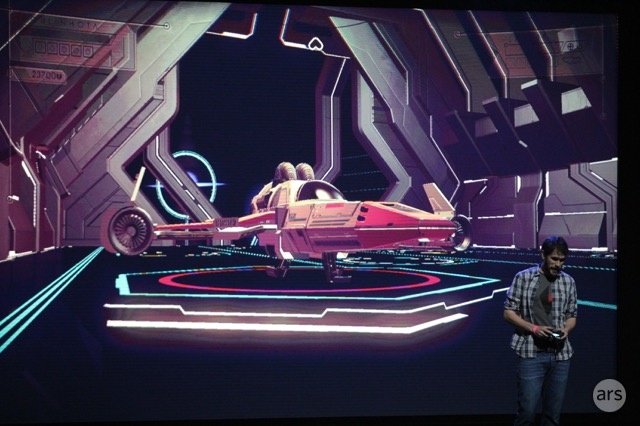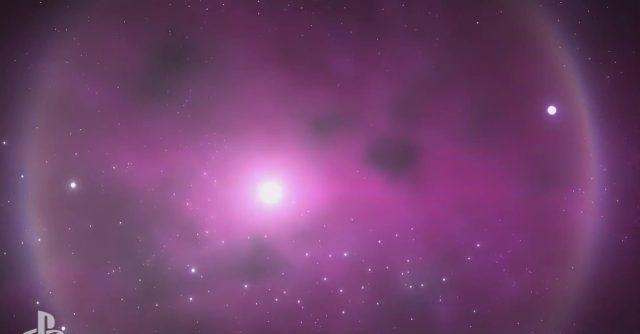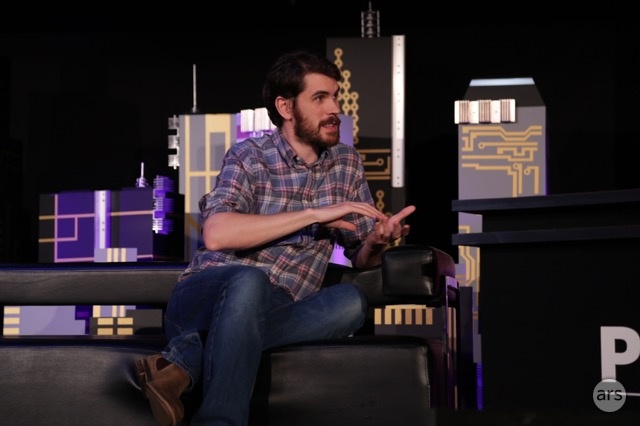No Mans Sky Next if You Die Then Die Again Is Your Stuff Lost
Gaming & Civilisation —
This man's sky: Hello Games' Sean Murray is making his dream game
But make sure to bring your imagination, because No Man'southward Sky won't feed you plot.

Sean Murray on stage at E3 demoing No Man's Sky.
Ars was treated to a closed-room demo of upcoming galaxy exploration game No Man's Heaven on Tuesday at E3. In that location, packed in a tiny and extremely warm conference room with a dozen other journalists, atomic number 82 designer Sean Murray showed off the current state of the game—starting off on an unexplored planet and eventually taking the states up into the swirling colorful depths of infinite.
Honestly, the most fascinating thing nigh No Man's Sky is Murray himself. Tall and thin, the Australian programmer sometimes has problem holding eye contact with the audience when we ask questions; he'due south simultaneously aristocratic and brimming with excitement about being able to present the game. His passion is infectious—this is clearly a person who loves what he's created and who can't wait to share information technology. He answers questions at length, but not laboriously—he talks very quickly, virtually breathlessly, giving in-depth just fast answers to the room and then turning dorsum to the game and describing its features at the same fast pace. The only time he'southward conspicuously at a loss is when one of the reporters in the room asks how many terabytes the procedural universe of No Man's Sky takes up on Hello Games' servers.
Murray pauses as if he's non quite sure where to outset with the answer—procedural galaxy generation is i of the most well-covered aspects of the game, and so request this question is a lot similar showing upwards to a dinner political party and request what food is—and then he launches into a fast, very abbreviated explanation of how the unabridged galaxy is algorithmically generated and doesn't exist as a complete dataset on a server somewhere. The reporter doesn't quite become information technology and asks the question once more but a different way, this time asking how much storage space is used for each planet.
"It's…it's all just maths," responds Murray, stumbling over the response and frowning. "It's just maths. There's no storage." He waves at the PR handler in the room to take over answering the question, ducking his head back down and bowing out of the conversation. We simply have thirty minutes in the demo room and this is taking away game fourth dimension, and Murray seems virtually baffled that the reporter doesn't get information technology.
Though the E3 demo we were shown isn't available online however—Murray and his team did the demo off of a new build that they created the night before, with some special features added—it was very similar to the footage he showed off on stage at the Sony E3 press conference Monday nighttime, which looked like this:
Sean Murray on stage at E3, showing off No Man's Heaven gameplay to the earth.
We got to meet a fleck more of the game mechanics—players can collect resources while on planetary surfaces, and use those resources to craft upgrades for their spacesuit and weapon and transport, or sell them for "units" (the in-game currency) which can exist used to purchase new ships or new items. Shooting lifeforms or otherwise being antisocial tin incur "wanted stars" that function essentially like Yard Theft Auto's wanted level, causing at kickoff minor drones and then larger and larger defenses to mobilize and attack you.
As they wander, players can scan for new discoveries—life forms and minerals, mainly–which are documented in a journal-like interface that Murray chosen "your own personal Pokédex." As you explore, you lot'll encounter beacons where you can upload your discoveries to the as-yet-unnamed galactic network; players can play offline equally long equally they similar, but only through connecting to the Internet in real life and hitting a buoy to upload their discoveries can they get credit for them (and if some other player discovers the aforementioned worlds or life forms and uploads them first, that other player gets the credit). This allows players to play offline, without an Net connectedness, for every bit long as they like—though if you lot die in-game, you lose any un-uploaded discoveries, then the incentive is there to be online as much as possible.
Murray took off and flew to a randomly selected planet far, far away. He told us that in the press demo build, his hyperdrive had unlimited range so that he could bear witness off the game without having to worry near refueling; in the release game, you'll need to upgrade your ship's hyperdrive to exist able to visit far away worlds. In fact, he said that ane very visible sign of "progress" in the game will be the range of a thespian's hyperdrive. He warped united states of america to a system about 500 light years away from his starting point, chosen totally at random, and he told us that he wasn't sure in that location would be annihilation there—and when we dropped downwards from hyperspace, we were in the middle of a giant capital ship battle that looked a scrap like something out of Battlestar Galactica or EVE Online.
This was apparently fortuitous happenstance—Murray explained every bit he headed for the nearest planet that while every organization by necessity has a space station for players to dock at and buy fuel, not every system has life, or even planets. It's a vast galaxy, and while life is in a lot of places, it's not everywhere.
Games and metagames
The last thing Murray did was zoom dizzyingly out into the galactic map, which looks a lot less like Aristocracy: Dangerous' map and a lot more similar the long deep zoom at the outset of the 1997 film Contact. Thick multicolored clouds of stars filled the view in every direction, and off in the altitude, a blinding calorie-free marked the heart of the galaxy—the place, according to Murray, where the game wants yous to eventually go. The place where No Man'due south Heaven ends.

Enlarge / The galactic center—where you lot're supposed to eventually get.
How yous get in that location, and how long it takes y'all, is entirely up to yous—and that brings usa to the function almost No Human's Sky that I think a lot of people are non going to like at all. Because while Murray promises a satisfying determination awaits the No Homo'south Heaven experience at the middle of the galaxy (and also that you tin go on playing after reaching the "end"), getting there is going to be the lion's share of the fun.
After the demo was over, Murray talked a bit almost not just his goals with making No Homo's Sky, but the gameplay experiences of his youth. He cited games like Ian Bell and David Braben's Elite as central to his growing up, along with Mario games various and sundry, and while he has the same kinds of aureate memories every bit I do of growing up gaming, he's also very taken with the lesser-up revolution that games like Minecraft have forced on the manufacture.
In Super Mario Bros, for example, the actor controls Mario and there's a reason for playing: you need to consummate levels to find and salvage the princess. Simply that kind of external motivation carries with it a lot of baggage—it imposes boundaries, however tenuous, on the story that the player tin create in his or her own mind. As Murray puts it, "I've been Mario. I've been Mario a million times! I want to be something else."
No Man'south Sky is the game that Murray says he's wanted to make since he was a niggling kid, and at its cadre it's a book filled with blank pages. In that location are no classes. There are no predefined roles. Beyond your ship and your adjust, there aren't whatsoever stats or levels; beyond "get to the center of the galaxy" there is no goal. Your in-game character has no name or groundwork or dialog or back story, and there'south no in-game dialog with NPCs or overly communicated moral decisions or choices to make to gain "calorie-free side" or "dark side" points.

Sean Murray at the PC Gamer show on Tuesday evening.
What is your character doing in No Homo's Sky? To answer that, you lot have to decide what you're doing in No Human'due south Sky. Why is your character going to the center of the galaxy? You lot have to determine why you're going there—or if you even want to go at that place at all.
Judging past some of the more than vocal responses to Elite: Unsafe—which has a similar but much-toned-down plotless structure where players accept to determine their own motivations and directions—this isn't going to sit well with a lot of players. If you're not comfortable making up a vast sheet of stories within your ain caput, then No Human being's Heaven might not be the kind of game that will hold your interest. If you're frustrated that Minecraft doesn't have more of an overly communicated "game" to information technology other than "dig and build," and then you volition have similar frustrations with No Man's Sky.
The cadence of Murray'southward speech gets faster as he gets more than and more excited—we're definitely a bit off-script as he gets into his feelings about games that permit you tell your own story, and he'due south clearly thrilled at beingness able to really talk about the game to the public. I went into the demo with just a middling level of excitement near the game, but information technology's hard to avoid catching at least a bit of Murray's almost kid-like joy equally he shows off what is conspicuously a game that comes straight from his eye. In a globe of AAA sequels and franchises, passion-driven projects similar No Man'south Sky are rare gems—and as lightheaded every bit information technology sounds, Murray made a believer out of me.
No Homo's Sky has no release appointment, but we're betting on 2016. It will launch simultaneously on PS4 and Windows PCs.
fergusonyestoorse.blogspot.com
Source: https://arstechnica.com/gaming/2015/06/this-mans-sky-hello-games-sean-murray-is-making-his-dream-game/
Post a Comment for "No Mans Sky Next if You Die Then Die Again Is Your Stuff Lost"